Kevin DeYoung's Blog, page 31
December 4, 2016
Monday Morning Music
November 30, 2016
A Plea to Pastors: Don’t Cancel Church on Christmas
 Dear brother pastor,
Dear brother pastor,
I hope it’s not too late to make you reconsider your decision to cancel church on Christmas.
I know that December is crazy busy–for you and for everyone else.
I know you probably have Christmas Eve services, maybe even one that bumps up against midnight.
I know that families like to gather Christmas morning to open presents.
I know that many of your people may be traveling and others won’t come to church on Christmas after coming on Christmas Eve.
I know that canceling church for one Sunday will not send all your people slouching to Gomorrah.
I know that getting volunteers for the worship team, and for the sound system, and for the nursery may be challenging.
I know that you’d rather not have to work on Christmas when you already had to work on Christmas Eve.
I know that you may have places to go and family to see.
I know that when Christmas falls on Sunday it’s an all around big pain (why couldn’t Leap Day do us a favor and skip over this problem?!).
But don’t do it. Don’t cancel all your services on Christmas. Scale back on the nursery perhaps. Take the week off from Sunday School. Make things closer to an hour than to an hour and a half. Skip the life groups or even the second service for a day. But don’t close the church up on Christmas.
You need reasons? Here’s a few.
1. Most people will come back. Even if half of your people don’t show up (and I imagine far more than half will be there), that’s still a gathering of 25 or 50 or 150 or 400 or 1200 people. In most churches, most of the people will still come to church on Christmas. And let’s not kid ourselves to think that we can encourage everyone to have a meaningful, thoughtfully prepared do-it-yourself service at home.
2. Visitors will be looking for a place to worship. Family members from out of town, neighbors, non-Christians, twice a year church goers–they may venture into your church on Christmas out of habit, out of curiosity, or just to hear some Christmas songs. Will anyone be there when they show up?
3. Family is a gift, not a god. I love, love, love waking up on Christmas, doing the advent wreath with the kids, having a big brunch, and opening presents with the family. Yes, it will be hectic to get everyone out of the house for church (thank you to my wife!). Yes, it will mean a delay in all the normal festivities. But maybe the normal festivities should not be deemed more important than the Festival itself. I want my family to know that we rearrange our schedule for corporate worship; we don’t expect corporate worship to be rearranged for us.
4. It’s Christmas for crying out loud! It’s the day we celebrate the incarnation, the birth of the Messiah, the entrance into our world of the second Person of Trinity. Don’t we want to sing? Don’t we want to celebrate? Don’t we want to preach and praise and pray?
5. It’s Sunday for crying out louder! I don’t have a problem with Advent and Christmas. In fact, I love this time of year. I’m not a huge church calendar guy, but I’m not bothered by focusing on the incarnation once every twelve months, especially when the world around us may, by God’s kindness, be tuned in to some of the same spiritual realities at the same time. But I’m enough of a Puritan to think that December 25 is Sunday before it’s Christmas. It’s the Lord’s Day. It’s a resurrection morning. It’s the day on which Christians have gathered for two thousands years to sing the Bible, preach the Bible, pray the Bible, and see the Bible in the sacraments. It’s the day of the week given for rest and worship. Why would we cancel church on Sunday just because that Sunday is extra special?
Maybe you’ve already printed the Advent schedule. Maybe the plans are already set. But it’s not too late to change your mind. Will your church’s ministry crumble without church one Sunday? I doubt it. But might it say something good and healthy about your convictions and priorities if you gather for corporate worship on December 25 just like you do every other Sunday? Something to think about.
November 28, 2016
Five Reasons to Consider Coming to Cross
 This December 27-30 I’ll be in Indianapolis with thousands of college students for our second national Cross Conference. There are lots of good options for students during Christmas break. We don’t want to take away from the good things other evangelical organization are doing to disciple college students for Christ. But with five million Christian students in this country, it’s not like there are too many opportunities for students to gather for worship and teaching.
This December 27-30 I’ll be in Indianapolis with thousands of college students for our second national Cross Conference. There are lots of good options for students during Christmas break. We don’t want to take away from the good things other evangelical organization are doing to disciple college students for Christ. But with five million Christian students in this country, it’s not like there are too many opportunities for students to gather for worship and teaching.
So why should you think about coming to Cross? Or think about encouraging the students in your home, in your church, and in your campus group to register?
Let me give you five reasons.
1. The conference is robustly, deliberately, joyfully, and seriously theological. We love spiritual experiences, but the goal of Cross is not simply an experience. Neither is the aim to give students a series of generically uplifting sermons. We’ve tried to make sure that everything–from the songs to the speakers to the booths to the books–are focused on the authority of the Scriptures, the uniqueness of Christ, and the centrality of the cross. We are praying for an atmosphere of passionate sacrifice, careful thinking, and mission-minded precision.
2. Some students are ready to go. By “go,” I don’t mean go to a conference, but go to the uttermost parts of the earth with the good news of Christ’s atoning death. These students may not need much convincing, but they still need a lot of connecting. They need next steps. They need to talk with sending agencies. They need resources. They need a push out the door, and they need to know how to find the open doors. A missions conference like Cross is designed to make these connections.
3. Every Christian student should think about going. I’m a pastor in the United States. I live 85 miles from where I grew up. I minister among lost people, but not among unreached peoples. I haven’t “gone.” But that doesn’t mean I never considered going (or have stopped considering). Most of the students who attend Cross will probably not end up spending their lives overseas as missionaries. There’s no shame in that. What would be a shame is if Christians in America never think and pray about the possibility of laboring among those who have least access to the gospel. Make yourself uncomfortable. Put yourself in the way of a challenge that could change your life.
4. Virtual attendance is a gift, not a substitute. I’ve been to hundreds of conferences. I’ve listened to hundreds of conference messages online. I’m thankful for the latter, but it’s not nearly the same as the former. You can’t sing songs with thousands of students from your bedroom. You can’t feel the energy in the room. You can’t sense what the Spirit is doing in the moment. You can’t meet new friends. You can’t bond in the car with old friends. You can’t stay up in your hotel room talking about what you’ve learned. By all means, listen to online messages. Follow the Twitter feed. Get the book. But none of it will be the same as being there.
5. We all have a part to play in the Great Commission. I attended a student missions conference when I was in college. I’m glad I did. Not only was I blessed by the Bible studies and by many of the speakers, I picked up good books, I made contacts with seminaries, I got a copy of Operation World, and I learned that the church was much bigger than I could have known. We need students to go, but we also need to students to stay. Not stay because they are indifferent to the plight of the nations, but stay because they will return to their churches as World Christians, ready to give, and pray, and be a champion for the global glory of Jesus Christ. The Great Commission is for every church and every Christian, which means a missions conference might be for you.
November 23, 2016
The One Who Gave Thanks
 Then one of them, when he saw that he was healed, turned back, praising god with a loud voice; and he fell on his face at Jesus’ feet, giving him thanks. Now he was a Samaritan. Then Jesus answered, “Were not ten cleansed? Where are the nine?” (Luke 17:15-17)
Then one of them, when he saw that he was healed, turned back, praising god with a loud voice; and he fell on his face at Jesus’ feet, giving him thanks. Now he was a Samaritan. Then Jesus answered, “Were not ten cleansed? Where are the nine?” (Luke 17:15-17)
Everyone reading this blog has reason to give praise to God. The question is whether we will go on our thankless way like the rest of the former lepers, or turn around and fall at Jesus’ feet like the Samaritan. Are you part of the one or one of the nine?
I find it easy to ask God for things. I find it relatively easy to confess sin, perhaps because I have so much of it and feel guilty for it. It is harder for me to give thanks, not because I think I’m too proud to say thank you, but because I don’t have my eyes open to see all that God has done and is doing.
All of us, I imagine, got sick in the past year. And almost all of us got better. Have we given thanks? If we are getting sicker, maybe even approaching death, have we given thanks for the grace to make it this far and for the grace that will lead us home?
There is so much God has done for us: jobs, paid our bills, paying our bills at church, safe travel, safe surgeries, miraculous provision for little babies over the past year. We’ve had good test results, open doors, and unexpected blessings. Have we thanked God?
Did you sleep last night? Did your kids? Will you eat tomorrow? Have you seen people recently converted? Are their relationships in the process of being healed? Did you sell your house or get married or finish school? Have you enjoyed the encouragement and support of the church? Have you enjoyed laughter and sympathy with friends? We’ve known guilt. We’ve received grace. Will we live out gratitude?
We aren’t all blessed in the same ways. But we all have been blessed in innumerable ways. Some return to Jesus with praise. Others do not. Which prompts Jesus to say two things: “Your faith has made you well” and “Where are the nine?”
Magnify Conference, December 2-3
 There is still time to register for next week’s Magnify Conference. Magnify is a two-day conference at University Reformed Church in East Lansing, Michigan.
There is still time to register for next week’s Magnify Conference. Magnify is a two-day conference at University Reformed Church in East Lansing, Michigan.
This year’s conference is December 2-3. Magnify is a great opportunity to meet other brothers and sisters from mid-Michigan (and beyond) and hear excellent teaching. It’s also inexpensive–only $5 for students and $10 for adults!
The keynote speaker this year is Ed Welch. Our theme is “Living for Approval, Dying from Rejection.” Here is the schedule:
Friday, December 2
Doors Open at 6:00pm
7:00 – 8:15 Session 1: Fear of Man: Time to Get Lower (Ed Welch)
8:30 – 9:30 Session 2: A conversation between Kevin DeYoung and Ed Welch
Saturday, December 3
7:45 – 8:45 Leader’s Breakfast (special sign up)
9:00 – 10:15 Session 3: Shame: God Raises You Up (Ed Welch)
10:30 – 11:30 Session 4: Bearing Shame and Scoffing Rude: How Christ Carried our Sin and Shame (Kevin DeYoung)
1:00 – 2:00 Session 5: Q/A with Ed Welch and Kevin DeYoung
2:15 – 3:15 Session 6: Shame: Listening to a New Voice (Ed Welch)
Conference ends at 3:30pm
The leader’s breakfast on Saturday morning is designed for church leaders and counselors. Seating is limited and we always fill up, so sign up soon. Ed Welch will also be preaching the two morning services (9:15, 11:00) at University Reformed Church on Sunday. All are welcome.
You can register for the Magnify Conference here.
November 21, 2016
A Case for Christian Magnanimity
 In case you hadn’t heard, Mike Pence went to see Hamilton last week, and it turns out that the people who star in Hamilton and buy tickets for Hamilton are not a natural constituency for Donald Trump. What this says about Broadway and Main Street, or Red States and Blue States I’ll leave for others to dissect. And whether lecturing the Vice President-Elect was an act of courageous resistance or blinkered rudeness is not what this post is about.
In case you hadn’t heard, Mike Pence went to see Hamilton last week, and it turns out that the people who star in Hamilton and buy tickets for Hamilton are not a natural constituency for Donald Trump. What this says about Broadway and Main Street, or Red States and Blue States I’ll leave for others to dissect. And whether lecturing the Vice President-Elect was an act of courageous resistance or blinkered rudeness is not what this post is about.
Instead, I want to talk about an old fashioned word: magnanimity.
What is magnanimity? Merriam-Webster defines it as “loftiness of spirit enabling one to bear trouble calmly, to disdain meanness and pettiness, and to display a noble generosity.”
In other words, see Mike Pence’s response to Hamilton Gate (and not so much Donald Trump’s tweets). I understand there is a time to fight, a time to stand your ground, a time to give as good as you get. But this was not one of those times. We must not confuse personal pique with national security. In fact, for most of us, most of the time, we would do well to take Pence’s approach: minimize our own offendedness and praise what we can, even in those who oppose us.
In September 1775, and in again in September 1787, the founding father John Witherspoon preached a sermon to the senior class at Princeton entitled “Christian Magnanimity.” He listed five principles of magnanimity:
1. To attempt great and difficult things.
2. To aspire after great and valuable possessions.
3. To encounter dangers with resolution.
4. To struggle against difficulties with perseverance.
5. To bear sufferings with fortitude and patience.
It is this last point that shapes the way we use the word today. The magnanimous person is the one who does not bear petty grudges, does not wallow in self-pity, does not demand penance, does not advertise his suffering, and does not stoop to settle every score. In an age where everyone is scrambling to be more aggrieved than everyone else, where we think nothing of retweeting praise and retweeting insults (to prove our aggrieved status), where apologies are routinely demanded and offendedness is next to godliness, surely we have much to learn about magnanimity.
It’s not only the right thing to do. It’s the smart thing to do. While we certainly want to stand up to real physical violence and insist on all the rights accorded us by God and by the laws of the land, when it comes to insults, rudeness, and social media scrappiness, killing them with kindness is usually the way to go. Whatever you think of the commentary from the cast of Hamilton, the post-play lecturing is apt to look brave when the President-elect demands an apology, and rudely self-important when the Vice President-elect says the show was terrific. We would do well to be more like David pardoning Shimei than the sons of Zeruiah looking for the next enemy to execute. Magnanimity is often its own reward.
Pastors, parents, politicians, pundits, internet pugilists–where can we show the sort of Christian magnanimity our world needs but rarely displays? For bearing burdens, eschewing meanness, and setting an example of noble generosity is not simply the way to win friends and influence people. It is the way of the cross. And the way of the One who hung there saying, “Father forgive them, for they know not what they do.”
Save
Monday Morning Humor
November 16, 2016
Book Briefs
It’s been awhile since I’ve done a Book Briefs post, so I have a stack of books to go through, some of which I’ve read cover to cover, and others I’ve dipped into here and there, but all of which are worth commending.
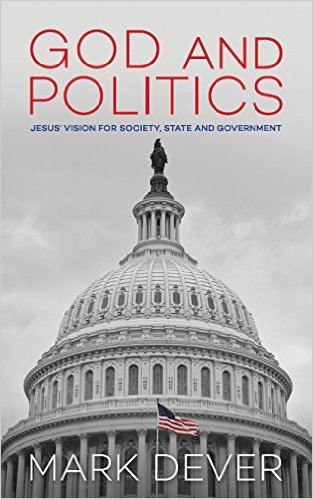 Mark Dever, God and Politics: Jesus’ Vision for Society, State and Government (10 Publishing, 2016). A terrific exposition of Mark 12:13-17 and a wonderful primer on how Christians should think about God and government. At fewer than 50 pages of text, this is a book you can read in one sitting and pass out to others. Dever’s careful and biblical conclusions provide a dose of sanity in a crazy political age.
Mark Dever, God and Politics: Jesus’ Vision for Society, State and Government (10 Publishing, 2016). A terrific exposition of Mark 12:13-17 and a wonderful primer on how Christians should think about God and government. At fewer than 50 pages of text, this is a book you can read in one sitting and pass out to others. Dever’s careful and biblical conclusions provide a dose of sanity in a crazy political age.
 William Taylor and Dave Dargue, Style or Substance: The Nature of True Christian Ministry (Christian Focus, 2016). Flowing out of Taylor’s preaching at St. Helen’s Bishopsgate (London), these expositions on 2 Corinthians 2-7 are both an example of faithful word ministry, and a necessary reminder that all lasting ministry must prioritize substance over style.
William Taylor and Dave Dargue, Style or Substance: The Nature of True Christian Ministry (Christian Focus, 2016). Flowing out of Taylor’s preaching at St. Helen’s Bishopsgate (London), these expositions on 2 Corinthians 2-7 are both an example of faithful word ministry, and a necessary reminder that all lasting ministry must prioritize substance over style.
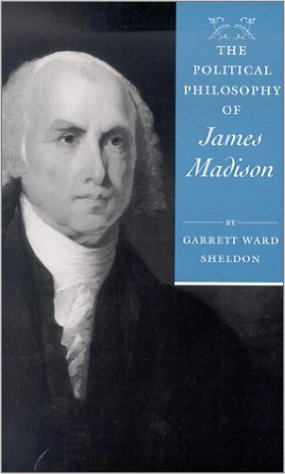 Garrett Ward Sheldon, The Political Philosophy of James Madison (Johns Hopkins University Press, 2001). Ward argues that Madion’s political philosophy was shaped by Lockean liberalism, classic Republicanism, and Protestant Christianity. Of special interest to me was Ward’s contention that we must not overlook John Witherspoon’s influence on the intellectual development of the Father of the U.S. Constitution.
Garrett Ward Sheldon, The Political Philosophy of James Madison (Johns Hopkins University Press, 2001). Ward argues that Madion’s political philosophy was shaped by Lockean liberalism, classic Republicanism, and Protestant Christianity. Of special interest to me was Ward’s contention that we must not overlook John Witherspoon’s influence on the intellectual development of the Father of the U.S. Constitution.
 J.D. Vance, Hillbilly Elegy: A Memoir of a Family and Culture in Crisis (Harper, 2016). I’ve read so many reviews of the book that I decided I needed to read the real thing for myself. While very, very few 30somethings should write a memoir, Vance’s story–from hillbilly crudity, love, and dysfunction to success at Yale and in Silicon Valley–is so arresting (and extreme) that there really is a story worth telling. What’s more, Vance tells his own story with the right combination of critical distance, sympathy, and honest cultural reflection. I admit that after 250 pages of terrible profanities, I found the language grating, but then again, I’m not sure how he could have told the story authentically without conveying the vernacular he grew up with. I’ve concluded that my upbringing has almost nothing in it that relates to Vance’s hillbilly dysfunction or to his uppercrust Yale experience. I guess I’m a boring, middle class Midwesterner through and through. One final note: I’d love to know more of Vance’s faith. He clearly had some kind of conversion to Christianity as a teenager, but what role the church and Jesus Christ play in his life now is hard to tell. The book would have left me feeling more hopeful it it had more clearly spelled out the need we all have for God’s grace. But maybe that’s not the story Vance wanted to tell, or at least not the story Harper wanted told.
J.D. Vance, Hillbilly Elegy: A Memoir of a Family and Culture in Crisis (Harper, 2016). I’ve read so many reviews of the book that I decided I needed to read the real thing for myself. While very, very few 30somethings should write a memoir, Vance’s story–from hillbilly crudity, love, and dysfunction to success at Yale and in Silicon Valley–is so arresting (and extreme) that there really is a story worth telling. What’s more, Vance tells his own story with the right combination of critical distance, sympathy, and honest cultural reflection. I admit that after 250 pages of terrible profanities, I found the language grating, but then again, I’m not sure how he could have told the story authentically without conveying the vernacular he grew up with. I’ve concluded that my upbringing has almost nothing in it that relates to Vance’s hillbilly dysfunction or to his uppercrust Yale experience. I guess I’m a boring, middle class Midwesterner through and through. One final note: I’d love to know more of Vance’s faith. He clearly had some kind of conversion to Christianity as a teenager, but what role the church and Jesus Christ play in his life now is hard to tell. The book would have left me feeling more hopeful it it had more clearly spelled out the need we all have for God’s grace. But maybe that’s not the story Vance wanted to tell, or at least not the story Harper wanted told.
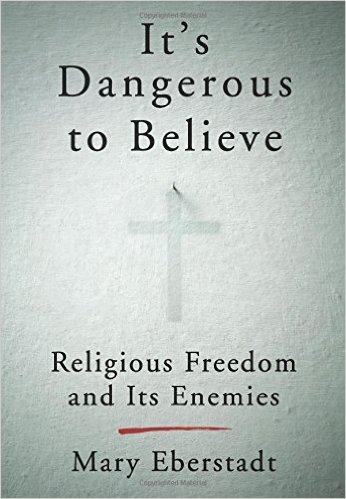 Mary Eberstadt, It’s Dangerous to Believe: Religious Freedom and It’s Enemies (Harper, 2016). If you think religious liberty is something to put in scare quotes or that right wingers have exaggerated the threats to our freedom, this short book is good place to start. Eberstadt details a host of concerning examples and puts them in a broader context of the new intolerance toward religion in the West.
Mary Eberstadt, It’s Dangerous to Believe: Religious Freedom and It’s Enemies (Harper, 2016). If you think religious liberty is something to put in scare quotes or that right wingers have exaggerated the threats to our freedom, this short book is good place to start. Eberstadt details a host of concerning examples and puts them in a broader context of the new intolerance toward religion in the West.
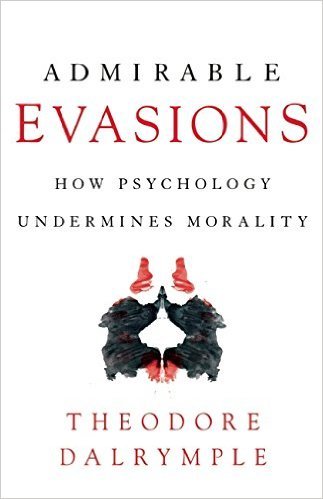 Theodore Dalrymple, How Psychology Undermines Morality (Encounter Books, 2015). Dalyrmple–a medical doctor and essayist–never writes a dull book. He’s always punchy and provocative. In this book he turns his acumen on the “admirable evasion” of blaming our immorality on our genes, our hard wiring, our chemicals, psychoses, or whatever.
Theodore Dalrymple, How Psychology Undermines Morality (Encounter Books, 2015). Dalyrmple–a medical doctor and essayist–never writes a dull book. He’s always punchy and provocative. In this book he turns his acumen on the “admirable evasion” of blaming our immorality on our genes, our hard wiring, our chemicals, psychoses, or whatever.
 Caroline Winterer, American Enlightenments: Pursuing Happiness in the Age of Reason (Yale, 2016). The key word in the title, or actually the key letter, is “Enlightenments.” Winterer joins the growing chorus of historians who argue that there wasn’t just one thing called The Enlightenment, but rather “multiple strands of conversations that cohered around the conviction that human reason might be applied to better the human condition” (7).
Caroline Winterer, American Enlightenments: Pursuing Happiness in the Age of Reason (Yale, 2016). The key word in the title, or actually the key letter, is “Enlightenments.” Winterer joins the growing chorus of historians who argue that there wasn’t just one thing called The Enlightenment, but rather “multiple strands of conversations that cohered around the conviction that human reason might be applied to better the human condition” (7).
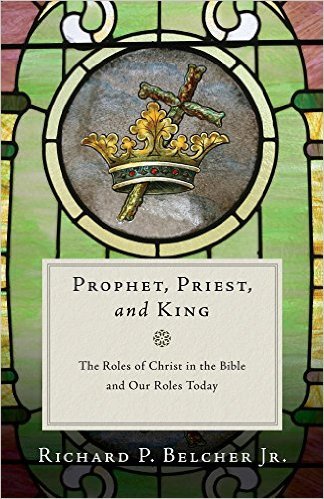 Richard P. Belcher Jr., Prophet, Priest, and King: The Roles of Christ in the Bible and Our Roles Today (P&R, 2016). It’s hard to believe there aren’t more go-to books on this crucial topic. Belcher, a Professor of Old Testament at Reformed Theological Seminary (Charlotte), has written an excellent monograph on the offices of Christ that seeks to put the roles of Christ in their proper biblical, theological, and pastoral context.
Richard P. Belcher Jr., Prophet, Priest, and King: The Roles of Christ in the Bible and Our Roles Today (P&R, 2016). It’s hard to believe there aren’t more go-to books on this crucial topic. Belcher, a Professor of Old Testament at Reformed Theological Seminary (Charlotte), has written an excellent monograph on the offices of Christ that seeks to put the roles of Christ in their proper biblical, theological, and pastoral context.
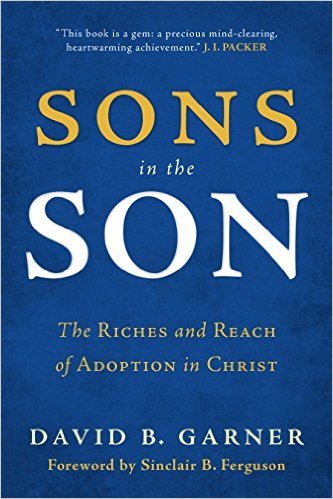 David B. Garner, Sons in the Son: The Riches and Reach of Adoption in Christ (P&R 2016). What Belcher does for the office of Christ, Garner, a Professor of Systematic Theology at Westminster Theological Seminary, does for the doctrine of adoption. Both books are scholarly, geared for students and pastors more than for a typical lay audience. But serious church members will find plenty of good, accessible material in both. Garner’s passion for the subject matter shows throughout the book.
David B. Garner, Sons in the Son: The Riches and Reach of Adoption in Christ (P&R 2016). What Belcher does for the office of Christ, Garner, a Professor of Systematic Theology at Westminster Theological Seminary, does for the doctrine of adoption. Both books are scholarly, geared for students and pastors more than for a typical lay audience. But serious church members will find plenty of good, accessible material in both. Garner’s passion for the subject matter shows throughout the book.
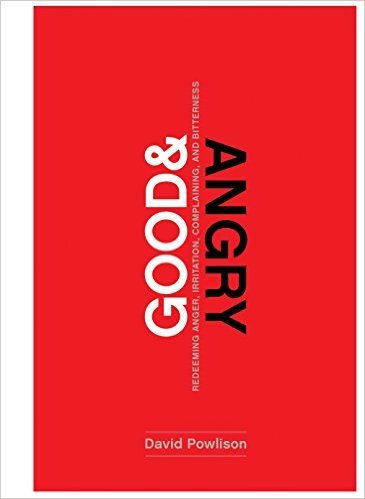 David Powlison, Good and Angry: Redeeming Anger, Irritation, Complaining, and Bitterness (New Growth Press, 2016). If it’s about the human condition and David Powlison wrote it, I read it. This is what you’d expect from Powlison: good illustrations, great questions, unflinching diagnosis, and hope for redemption. I never thought of myself as an angry person…until I had a lot of kids. Now I know I need a book like this.
David Powlison, Good and Angry: Redeeming Anger, Irritation, Complaining, and Bitterness (New Growth Press, 2016). If it’s about the human condition and David Powlison wrote it, I read it. This is what you’d expect from Powlison: good illustrations, great questions, unflinching diagnosis, and hope for redemption. I never thought of myself as an angry person…until I had a lot of kids. Now I know I need a book like this.
Save
November 14, 2016
A Post-Election Prayer
 I’ve had people ask me before, with more than a hint of criticism, “Why do you post these prayers? Are you trying to parade your righteousness before others?” While I suppose there is always the danger that one puts out a prayer for the praise of men (a danger with any public post), that’s not why I include prayers like this on my blog (at least not what I think is going on in my heart). I post prayers from time to time because (1) we need examples (even imperfect ones) of how to pray, (2) it serves my congregation, and (3) sometimes when I don’t know the right analysis or the best forward, I figure I can at least pray.
I’ve had people ask me before, with more than a hint of criticism, “Why do you post these prayers? Are you trying to parade your righteousness before others?” While I suppose there is always the danger that one puts out a prayer for the praise of men (a danger with any public post), that’s not why I include prayers like this on my blog (at least not what I think is going on in my heart). I post prayers from time to time because (1) we need examples (even imperfect ones) of how to pray, (2) it serves my congregation, and (3) sometimes when I don’t know the right analysis or the best forward, I figure I can at least pray.
So here’s how I led my church in prayer this past Sunday.
*******
Our good and gracious heavenly Father, we praise for your almighty and ever present power, by which you uphold, as with your hand, all things.
When we don’t know what will happen with our health, we trust you. When we don’t know what we will happen with those we love, we rest in you. And when we don’t know what will happen with our nation, we turn to you.
In the midst of a world filled with triumphalism on the one hand and recriminations on the other, in a world where we tend to assume the worst of those who are not like us, help the church to show a more excellent way. May the world look in at our counter-culture communities and say with astonishment, “See how they love one another.” Give us the empathy to listen to one another and the wisdom to learn from what we hear.
May the church show forth the kind of diversity worth pursuing–the diversity of every nationality, and every race, and every class, and every color confessing sins together and together worshiping the risen Christ.
As we are commanded in 1 Timothy 2, we pray for Donald Trump, the next President of the United States.
Grant him wisdom, courage, and integrity as a man and as a leader. Keep him faithful, kind, and loving as a husband and father.
Give him a heart for the poor, concern for the powerless, and compassion for the weak. May he resist the temptation to settle scores and tear others down. Give him a heart, a disposition, and a commitment to honor women, protect the vulnerable, and reject all racial animus.
Put before him the best information and the most intelligent counselors so he can make good decisions about economic and foreign policy and choose capable men and women for a vast array of judicial, cabinet-level, and bureaucratic appointments.
May the President be guided by both courage and restraint as Commander-in-Chief of our armed forces. Make him a defender of the unborn and a champion for religious liberty.
Make him a man of prayer and a daily student of the Scriptures. Give him the humility to see his sins, the honesty to admit his faults, the grace to forgive his enemies, and the strength of character to change his mind.
Lead him to a firmer understanding of the truth of the gospel, a resolute commitment to obey the Word of God, and a passion to promote what accords with your truth.
By your grace, heavenly Father, may President Trump be a better man than many expect and a better man than we deserve.
And no matter the smiles or frowns of providence, keep your people faithful to the things we know we must do: to love our neighbors as ourselves and to love the Lord with all our heart, soul, strength, and mind.
Make us quick to serve and eager to speak the truth in love. Grant us the privilege to bear witness to the only King who keeps all his promises and the only One whose kingdom knows no end.
In the name of Christ–the only name given among men whereby we must be saved–we pray, Amen.



